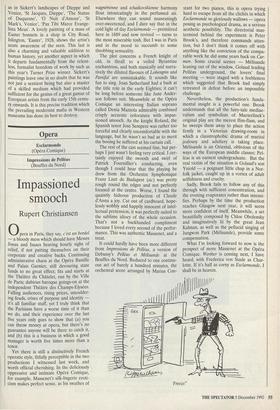Opera
Esclarmonde (Opera Comique) Impressions de Pelleas (Bouffes du Nord)
Impassioned smooch
Rupert Christiansen
Opera in Paris, they say, c'est un bordel — a bloody mess which should have Messrs Jonas and Isaacs heaving hourly sighs of relief, if not patting themselves on their corporate and creative backs. Continuing administrative chaos at the Opera Bastille and Palais Gamier, still devouring state funds to no great effect; fits and starts at the Theatre du Chatelet, run by the Ville de Paris; dubious baroque goings-on at the independent Theatre des Champs-Elysées. Falling audiences, rising prices, smoulder- ing feuds, crises of purpose and identity — it's all familiar stuff, yet I truly think that the Parisians have a worse time of it than we do, and their experience over the last five years only goes to show that (a) you can throw money at opera, but there's no guarantee anyone will be there to catch it, and (b) this is a business in which a good manager is worth five times more than a tenor.
Yet there is still a distinctively French operatic style, fitfully perceptible in the two productions I witnessed last week, and worth official cherishing. In the deliciously oppressive and intimate Opera Comique, for example, Massenet's silk-lingerie eroti- cism makes perfect sense, as his swathes of wagnerienne and tchailcovskienne harmony float intoxicatingly in the perfumed air. Elsewhere they can sound nauseatingly over-sweetened, and I dare say that in the cold light of day Esclarmonde — premiered here in 1889 and now revived — turns to the most miserable tosh. But I was in Paris and in the mood to succumb to some throbbing sensuality.
The plot concerns a French knight of old, in thrall to a veiled Byzantine enchantress, and both musically and narra- tively the diluted flavours of Lohengrin and Parsifal are unmistakable. It sounds like fun to sing. Joan Sutherland had a bash at the title role in the early Eighties; it can't be long before someone like June Ander- son follows suit. Meanwhile at the Opera Comique an interesting Italian soprano called Denia Mazzola admirably combined crisply accurate coloratura with impas- sioned smooch. As the knight Roland, the Spanish tenor Jose Sempere was rather too forceful and clearly uncomfortable with the language, but he wasn't so bad as to merit the booing he suffered at his curtain call.
The rest of the cast seemed fine, but per- haps I just wasn't feeling very critical. I cer- tainly enjoyed the swoosh and swirl of Patrick Fournillier's conducting, even though I could hear that the playing he drew from the Orchestre Symphonique Franz Liszt de Budapest (sic) was pretty rough round the edges and not perfectly focused at the centre. Worse, I found the quaintly hideous production of Claude d'Anna a joy. Cut out of cardboard, hope- lessly wobbly and happily innocent of intel- lectual pretension, it was perfectly suited to the sublime idiocy of the whole occasion. That's not a backhanded compliment because I loved every second of the perfor- mance. This was authentic Massenet, and a treat.
It could hardly have been more different from Impressions de Pelleas, a version of Debussy's Pelleas et Melisande at the Bouffes du Nord. Reduced to one continu- ous act of barely a hundred minutes, the orchestral score arranged by Marius Con- stant for two pianos, this is opera trying hard to escape from all the clichés in which Esclannonde so gloriously wallows — opera posing as psychological drama, as a serious aesthetic possibility. The directorial mas- termind behind the experiment is Peter Brook's, and therefore commands atten- tion, but I don't think it comes off with anything like the conviction of the compa- rable work he did some years back on Car- men. Some crucial scenes — Melisande leaning out of the window, Golaud leading Pelleas underground, the lovers' final meeting — were staged with a feebleness which suggested that Brook had simply retreated in defeat before an impossible challenge.
Nevertheless, the production's funda- mental insight is a powerful one. Brook understands that all the fairy-tale mediae- valism and symbolism of Maeterlinck's original play are the merest flim-flam, and he sweeps them away to place the action firmly in a Victorian drawing-room in which a claustrophobic drama of marital jealousy and adultery is taking place. Melisande is an Oriental, oblivious of the ways of the European middle classes; Pet- leas is an earnest undergraduate. But the real victim of the situation is Golaud's son Yniold — a poignant little chap in a Nor- folk jacket, caught up in a vortex of adult selfishness and cruelty.
Sadly, Brook fails to follow any of this through with sufficient concentration, and the evening evaporates rather than intensi- fies. Perhaps by the time the production reaches Glasgow next year, it will seem more confident of itself. Meanwhile, a set beautifully composed by Chloe Obolensky and imaginatively lit by the great Jean Kalman, as well as the pellucid singing of Jungwon Park (Melisande), provide some compensation.
What I'm looking forward to now is the prospect of more Massenet at the Opera Comique. Werther is coming next, I have heard, with Frederica von Stade as Char- lotte. If it's half as corny as Esclarmonde, I shal be in heaven.
'Freeze!'










































































 Previous page
Previous page